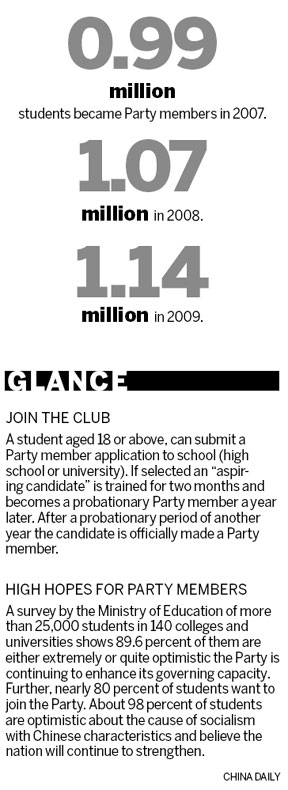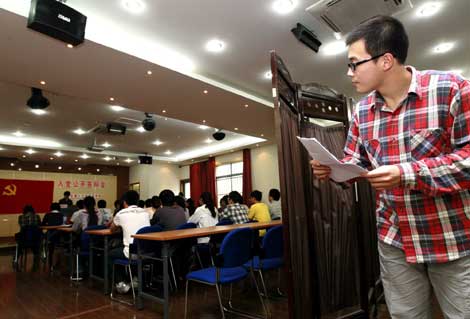Society
Student life's a Party
Updated: 2011-06-13 08:53
By Lin Qi and Guo Shuhan (China Daily)
|
Shanghai East China University of Science and Technology student Jiang Weirong (right) waits for his turn to speak at an event organized by the university for those who want to join the Communist Party of China. Chen Fei / Xinhua |
Student enrollment in the Communist Party of China is increasing, though political advancement is just one of the many reasons why they join up. Lin Qi and Guo Shuhan report.
When she was young, Jiang Yang often listened to her late grandmother talking about how much the country had changed after the founding of New China. "She wasn't a Communist. In fact, she and my grandfather were persecuted during the 'cultural revolution' (1966-76). But they never complained about it and still endorsed socialism and the Communist Party of China (CPC), which I found quite difficult to understand," she says.
Jiang, 23, a postgraduate student at East China Normal University in Shanghai, joined the Party as an undergraduate, on the advice of her mother, Qu Min, a Party member and civil servant.
"I think university students should take part in an organization to gain a sense of belonging. They also need Party regulations to maintain appropriate behavior and encourage self-discipline," Qu says.
Jiang says she used to discuss with her grandmother the wrongdoing of governmental officials and recalls that her answer was there were always twists and turns in the process of social advancement.
"I've come to understand and agree with her. The most important thing, as a Party member, is to make positive changes in the public interest," the Party branch secretary says.
Organization Department of the CPC Central Committee figures show more than 1.07 million students became Party members in 2008, accounting for 38 percent of new Party members, an increase of 2.2 percent over the previous year.
But unlike previous generations of Party members who were primarily political in their outlook, new generation Party members are more independent and have varied views on social issues.
Zhang Minyu, a Peking University postgraduate student, became a Party member in his third year at university. He is now a Party branch secretary looking after nearly 140 students.

"Some students join the Party because they are ambitious and want to make something of their lives as Party members. Some enroll to improve themselves, while many others regard the organization as a platform to make friends," Zhang says.
He adds most branch members, even those from the same department, seldom communicate with each other because they have different class times and dormitories, so the Party branch activities give them an opportunity to meet up.
Zhang, who spent a year in India as an exchange student when he was an undergraduate studying Hindi, says he was stunned by the development gap between the two countries.
"At home, there are always a lot of complaints about what we think should be improved," he says. "But when we have the chance to objectively compare our achievements with other countries, we feel quite proud of our nation and of the Communist Party of China that has led us forward."
Liu Xiaocui, 25, applied for Party membership in her third year at high school. The Peking University graduate is a probationary candidate.
"The reason I want to be a Party member is because I think the government still has a lot of work to do and I'd like to make a contribution. If I am a Party member, my voice will be heard more easily and my ideas may be adopted," she says.
She adds Party members from her parents' generation were more likely to believe in the tenets of communism, while young people today have more practical reasons for joining up.
They may consider Party membership to be a stepping-stone to success when applying for jobs in government, or State-owned companies.
Li Hao, a teacher in charge of student Party member applications at the School of Communication, East China Normal University in Shanghai, says about 50 undergraduate and postgraduate students are recruited every year.
In previous years, Li says, some students only applied to join the Party in the final year of university so they could land jobs at State-owned media. This is now prohibited.
"We teachers hope students join the organization to serve the interests of the people and the country, not just for job opportunities," Li says.
Qu Min says some students join the Party in order to boost their chances of becoming a civil servant. The government affairs service center employee in Chengdu, capital of Sichuan province, says there are, however, many government organization positions that are available to non-Communists.
Shao Xuejun, Party committee secretary of the School of Foreign Languages, Shenyang Normal University in Liaoning province, says employers generally do not show a preference for Party members, rather they are looking for talent.
He says while Party members of his generation are not so likely to express their opinions openly, young Party members are more active and have a good grasp of social issues.
"Often I am stopped by a student who will list their concerns about something and what should be done to make it right.
"Students receive masses of information from multiple channels, daily. This sets a higher standard for our Party work," Shao says, adding teachers needed to spend time researching what students are interested in.
"I spent two weeks during the summer vocation watching films that were popular among students, because I found they were talking about films that I knew nothing about."
Yu Jie, a student of forensic medicine at Wenzhou Medical College in Zhejiang province, says the most important thing about being a Party member is to understand the government.
"Party membership makes us care more about State affairs and provides us with a comprehensive approach to understanding policies."
E-paper

Pearl on the Yangtze
Wuxi is considered a town of natural beauty and its motto is "city of water and warmth".
Prose and consternation
Riding on a mystery train
Way of a warrior
Specials

Wealth of difference
Rich coastal areas offer contrasting ways of dealing with country's development

Seal of approval
The dying tradition of seal engraving has now become a UNIVERSITY major

Making perfect horse sense
Riding horses to work may be the clean, green answer to frustrated car owners in traffic-trapped cities

